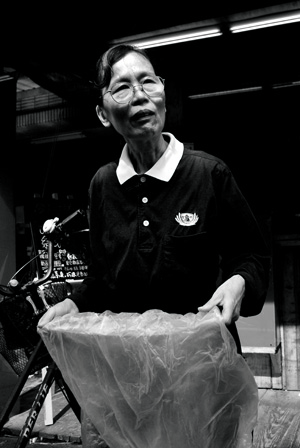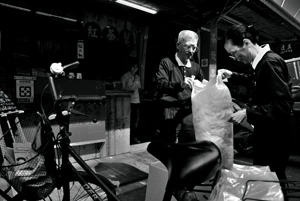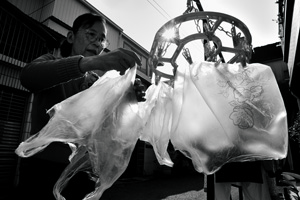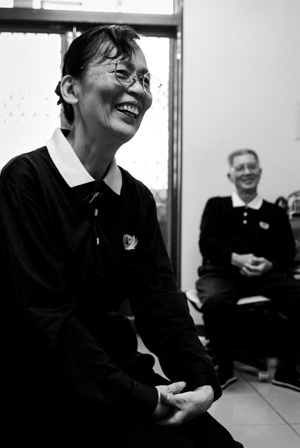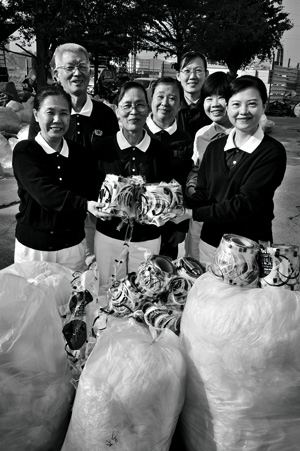

| Give Me Your Plastic Bags | ||||
| By Cai Yu-xuan and Huang Xiao-zhe Translated by Tang Yau-yang Photos by Huang Xiao-zhe | ||||
One cannot walk a block or two on a typical busy street in Taiwan without passing at least one or two beverage stores. They seem to be everywhere, catering to the public’s insatiable thirst for pearl milk tea, fruit juice mix, or other sugary drinks. A typical beverage order comes in a paper or plastic cup. To keep the drink from spilling, the top is sealed with a thin plastic cover glued on with an automated sealing machine. The cup and a sharp-tipped straw (to puncture the thin plastic cover) are then put into a plastic bag and given to the customer to carry away. Ye Mei-yu (葉梅玉) walks past several such stores in the southern city of Tainan before coming across a section of the street jam-packed with people. Ye sees the crowd perusing stalls with vendors selling vegetables, fruit, and other necessities. Whatever their purchase, the buyer almost always receives his or her order in plastic bags. A bag here and a bag there add up quickly when one considers how many items are sold each day at these types of places. All of this greatly troubles Ye. Her concern about plastic bags started six years ago when she walked into a beverage store to put up a Jing Si aphorism poster. (To allow these maxims by Master Cheng Yen to reach more people, Tzu Chi volunteers post them in stores after obtaining permission from store owners.) While in the store, she saw large plastic bags that had been cast aside as waste. The large bags had contained beverage cups, shipped from the cup supplier to the store. Given how many drinks were sold each day, it was quite reasonable to assume that the store routinely threw away many of these sorts of bags. Though relatively thin, plastic bags nonetheless are very bad for the environment. They don’t easily decay, and will be around in landfills for years to come. They can be incinerated instead, but then they result in bad air pollution. Either way, the land or the air gets fouled up by their disposal. Sadly, people indulge themselves in the convenience provided by disposable plastic bags without thinking much about the damage their actions may be inflicting on the Earth. Ye could not stand to witness such behavior, so she asked the store management for permission to collect their plastic bags for recycling. That request six years ago marked the beginning of the plastic bag recycling initiative in her neighborhood, the Annan district of Tainan. Helping the Earth together On a typical day, Ye and her husband collect used plastic bags from beverage stores in their neighborhood and haul what they’ve collected home on their bicycles. They can accumulate quite a large number of plastic bags in just a few bike trips. However, even assuming that they can always reclaim them at top speed and efficiency, the amount they collect can never keep pace with what stores and consumers produce every day.
At the couple’s home, one can often see plastic bags being sun dried in the open air. Ye washes unclean bags before hanging them on clothes lines to dry, a unique sight in their small alley. She folds some of the dried bags into triangular shapes, which she then reuses as shopping bags.
Though the couple’s recycling efforts are out-paced by what is being produced, they know that they are doing the right thing. Undaunted, they press on. Whenever she can, she tells people, friends, and store owners the importance of “reduce, reuse and recycle.” Her commitment has paid off: Over ten Tzu Chi volunteers have joined the couple in collecting bags from six dozen stores in the Annan district. You and I can help, too One day I invited Ye and some of her cohorts to a local Tzu Chi recycling station so I could take their photos. As they assembled for the picture, it dawned on me that we could use a prop or two to put in front of the group. Looking around, I saw some plastic bags and decided to add them to the photo. The group immediately recognized the plastic bags and the other recyclables that I had fetched. The props prompted them to shout together, “Yes, we got all those from the stores.” Their smiles show that they are happy that their efforts are making a difference. However, they are also keenly aware that the abundance of plastic bags that they have been able to collect clearly indicates how badly overused plastic bags have become. “Nowadays, I don’t call on volunteers to help collect and recycle as much as I urge people to cut down on the use of plastic bags,” Ye said. Indeed, where efforts to help the Earth are concerned, reducing the amount of garbage is always much more effective than increasing reclamation. Love the environment. Be eco-friendly. That is not only Ye’s wish, but also that of our own Mother Nature. If each of us could forgo the use of one plastic bag per day, per week or even per month, the accumulative effect would be astounding.
|
















|

